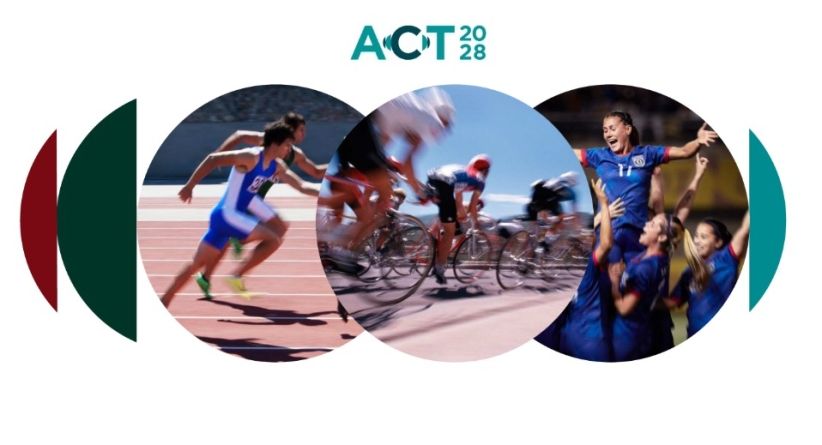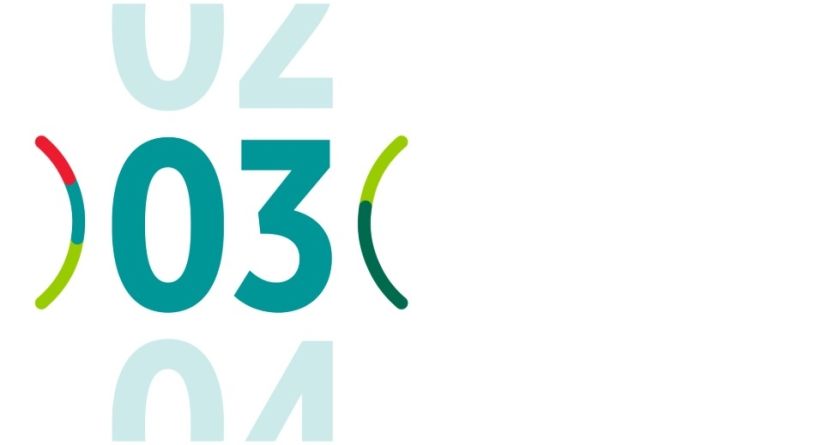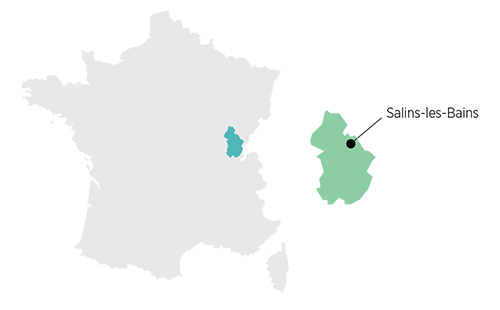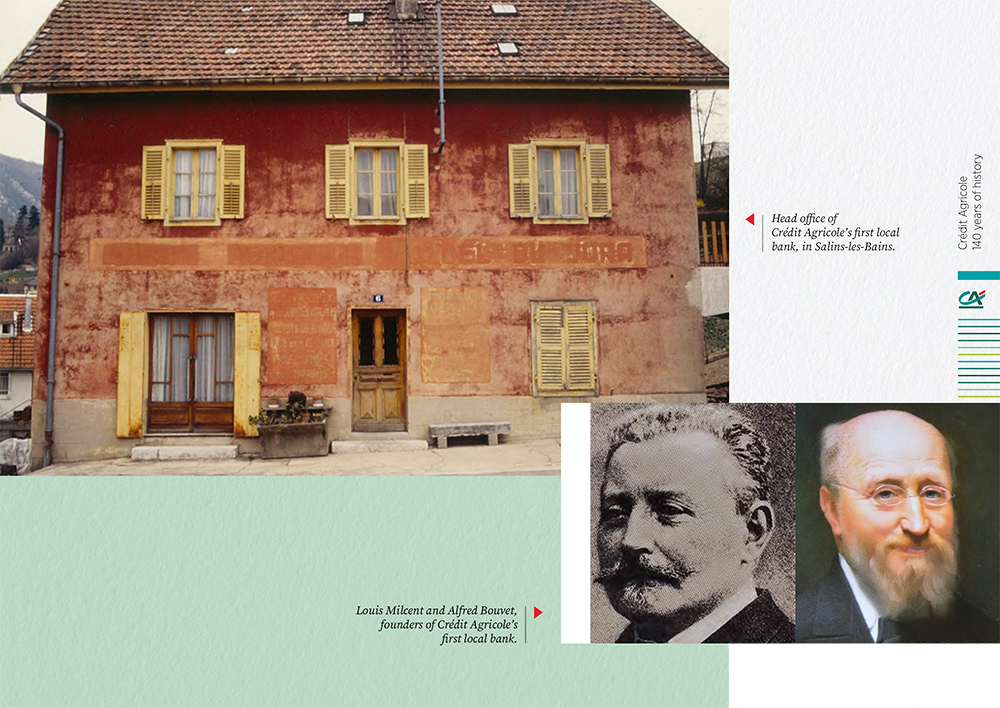
Crédit Agricole 140 years of history : 1880s - Creation in the Jura
Our story begins in 1885 in Salins-les-Bains in the Jura.
At that time, French farming was in a poor state. It was suffering the effects of international competition and from several health crises affecting production. Farmers struggled to find funding to grow. At the time, banks were located mainly in urban areas and did not understand the specific needs of farmers or the pace of production. Farmers themselves were wary of loans, which they saw as the first step towards ruin.
It is in this context that two men created Crédit Agricole’s first local bank. Alfred Bouvet headed a forestry company that sold its production in Europe. Louis Milcent was a former auditor at the Council of State who came to settle in the Jura département. They saw that local farmers earned little from their work and that it was difficult for them to improve their working conditions.
Alfred Bouvet and Louis Milcent were inspired by the ideas of mutualism that had been gaining ground across Europe for several decades.
On 25 February 1885, the “Caisse de crédit mutuel agricole de l’arrondissement de Poligny” was created. Alfred Bouvet made staff available from his company, and the head office was established in Salins-les-Bains
The first members and directors were prominent local citizens. Borrowers - “honest and hard-working farmers” - could obtain loans of up to 600 francs, the price of two draught oxen. The loans were short-term facilities that could only be used to finance farming equipment.
The very positive outcome of the initial trial encouraged the government to promote mutualism in rural areas of France.
Mutualism is a socio-economic model that consists of bringing together people who share the same goal. Mutual shareholders pool money in a “fund” and can lend money to members of society according to their needs.
This is a democratic set-up because it operates according to the principle of 1 person = 1 vote.
Large and small contributors have equal weight when voting at shareholder meetings.
In the same Series
-
 Crédit Agricole 140 years of history: 2025 until todayCrédit Agricole is now an original model of universal retail banking.
Crédit Agricole 140 years of history: 2025 until todayCrédit Agricole is now an original model of universal retail banking. -
 Crédit Agricole 140 years of history: 2010s - The expression of our “Raison d’être”At the beginning of this decade, Crédit Agricole: included 39 regional banks, fully-fledged banks and the majority shareholders of the central institution Crédit Agricole S.A.; was active in all banking businesses; provided services to all types of customers, from individuals to corporates and institutional investors, from the most vulnerable to the wealthiest; included a second retail banking network, LCL; was present throughout France and on all continents.
Crédit Agricole 140 years of history: 2010s - The expression of our “Raison d’être”At the beginning of this decade, Crédit Agricole: included 39 regional banks, fully-fledged banks and the majority shareholders of the central institution Crédit Agricole S.A.; was active in all banking businesses; provided services to all types of customers, from individuals to corporates and institutional investors, from the most vulnerable to the wealthiest; included a second retail banking network, LCL; was present throughout France and on all continents. -
 Crédit Agricole 140 years of history: 2000s - A new dimensionIn 2001, the regional banks, the majority shareholders of Caisse Nationale de Crédit Agricole, decided to open up its capital to the public.
Crédit Agricole 140 years of history: 2000s - A new dimensionIn 2001, the regional banks, the majority shareholders of Caisse Nationale de Crédit Agricole, decided to open up its capital to the public. -
 Crédit Agricole 140 years of history: 1990s - A growing groupCrédit Agricole, no longer under government supervision, was now in control of its destiny. It completed its goal of becoming a universal bank with the ambition of being useful to all.
Crédit Agricole 140 years of history: 1990s - A growing groupCrédit Agricole, no longer under government supervision, was now in control of its destiny. It completed its goal of becoming a universal bank with the ambition of being useful to all. -
 Crédit Agricole 140 years of history: 1980s - The beginnings of universal bankingIn the early 1980s, Crédit Agricole operated throughout France, including in the largest urban areas. It also began to develop its international network with a growing number of new locations (Frankfurt, Milan, Cairo, Singapore, etc.).
Crédit Agricole 140 years of history: 1980s - The beginnings of universal bankingIn the early 1980s, Crédit Agricole operated throughout France, including in the largest urban areas. It also began to develop its international network with a growing number of new locations (Frankfurt, Milan, Cairo, Singapore, etc.). -
 Crédit Agricole 140 years of history: 1970s - From rural to internationalFrom 1971, Crédit Agricole’s geographical scope gradually expanded.
Crédit Agricole 140 years of history: 1970s - From rural to internationalFrom 1971, Crédit Agricole’s geographical scope gradually expanded. -
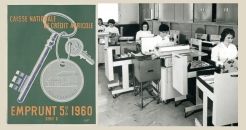 Crédit Agricole 140 years of history: 1960s - A decade of renewalSince 1897, Crédit Agricole received advances from the government each year, which it had to repay.
Crédit Agricole 140 years of history: 1960s - A decade of renewalSince 1897, Crédit Agricole received advances from the government each year, which it had to repay. -
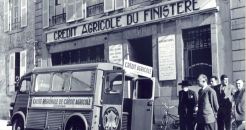 Crédit Agricole 140 years of history: 1950s - Expansion of the networkIn the early 1950s, Crédit Agricole developed savings inflows to boost financing for French farmers.
Crédit Agricole 140 years of history: 1950s - Expansion of the networkIn the early 1950s, Crédit Agricole developed savings inflows to boost financing for French farmers. -
 Crédit Agricole 140 years of history: 1940s - War and reconstructionThe Second World War disrupted the organisation of Crédit Agricole.
Crédit Agricole 140 years of history: 1940s - War and reconstructionThe Second World War disrupted the organisation of Crédit Agricole. -
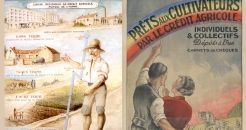 Crédit Agricole 140 years of history : 1930s - Helping farmers through the crisisThe 1929 crisis that began in the United States reached France in the following years.
Crédit Agricole 140 years of history : 1930s - Helping farmers through the crisisThe 1929 crisis that began in the United States reached France in the following years. -
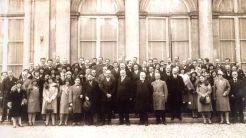 Crédit Agricole 140 years of history : 1920s - Electricity and housingThe birth of the Caisse Nationale de Crédit Agricole
Crédit Agricole 140 years of history : 1920s - Electricity and housingThe birth of the Caisse Nationale de Crédit Agricole -
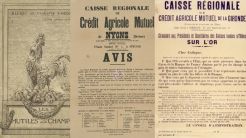 Crédit Agricole 140 years of history : 1910s - Serving the entire countryAt this time, two important measures strengthened Crédit Agricole’s action in its fight against rural depopulation.
Crédit Agricole 140 years of history : 1910s - Serving the entire countryAt this time, two important measures strengthened Crédit Agricole’s action in its fight against rural depopulation. -
 Crédit Agricole 140 years of history : 1900s - First extension of the scope of actionThe first decade of the 20th century saw Crédit Agricole establish a lasting presence in the regions.
Crédit Agricole 140 years of history : 1900s - First extension of the scope of actionThe first decade of the 20th century saw Crédit Agricole establish a lasting presence in the regions. -
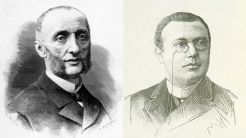 Crédit Agricole 140 years of history : 1890s - A bottom-up organisationCreation of the local banks
Crédit Agricole 140 years of history : 1890s - A bottom-up organisationCreation of the local banks


